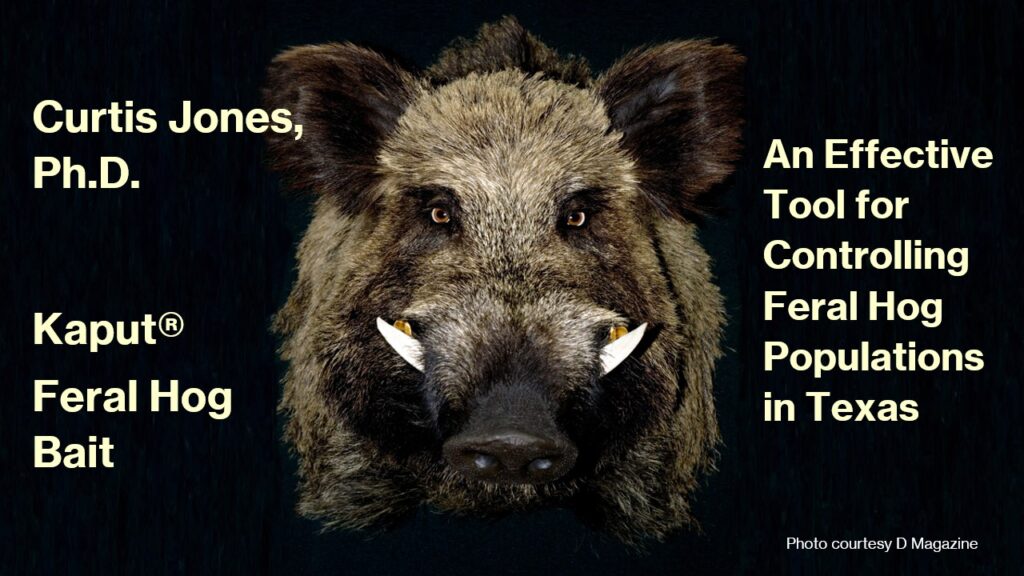Cali Bakker, Class of 2024

Feral hogs (Sus scrofa), an invasive species in Texas, pose significant challenges due to their destructive behaviors, including rooting, wallowing, and predation. Originally introduced through domestic swine in the 1500s and supplemented by Eurasian wild boar in the 1930s, feral hogs have rapidly spread across the state. These animals are highly adaptable, opportunistic omnivores with a preference for areas near water. Their prolific reproduction, resilience, and generalist diet enable them to thrive in diverse habitats, leading to widespread damage to crops, waterways, property, and native ecosystems. Feral hogs also compete with wildlife and livestock and can transmit diseases to both animals and humans.
To mitigate the impacts of feral hogs, Kaput® Feral Hog Bait, a warfarin-based toxicant, was introduced and registered by the EPA in 2017. This document details the proper use of Kaput®, highlighting its chronic toxicity, requiring repeated consumption to be lethal, and the need for precise implementation via hog-specific feeders. Pre-baiting protocols using corn help condition hogs to the feeders before transitioning to the toxic bait. Field studies in Texas, conducted by Texas A&M AgriLife Extension across multiple counties, demonstrated the effectiveness of Kaput® when used according to label protocols. However, challenges such as alternative food availability and inconsistent baiting can hinder success.
The safety of the bait was a key consideration, with studies indicating minimal risk of secondary toxicity to non-target animals and humans. Although direct consumption of the bait is harmful, strict adherence to label guidelines ensures the protection of livestock and the environment. The bait is a valuable tool in integrated pest management strategies for controlling feral hog populations in Texas, with success dependent on the dedication of landowners and consistent baiting practices.
Tuesday, October 8, 2024 – 7:00 PM
Click here to view our Calendar.
- SRC Doors will open at 6:30 PM
- Zoom meeting waiting room will open at 6:45 PM
- Business Meeting will begin at 7:00 PM
- Naturalist Talk will begin at 7:30 PM (approximately)
Topic: Kaput® Feral Hog Bait: An Effective Tool for Controlling Feral Hog Populations in Texas
Speaker: Curtis Jones, Ph.D., agriculture and natural resources, Collin County. Jones, of Tom Bean, earned a bachelor’s and master’s in agronomy from Texas A&M and a doctorate from Louisiana State University. Previously, he worked in weed biology, ecology and herbicide interactions during his time in Louisiana and then as an assistant professor for the past 14 years at Texas A&M Commerce. Jones said he looks forward to working with the producers and youth in Collin County. “I joined AgriLife Extension to help producers and to help those who want to learn.”
Physical Meeting Location: Heard Natural Science Museum & Wildlife Sanctuary,
1Nature Place, McKinney TX 75069, Science Resource Center (SRC) building.
Directions to SRC: Drive through Heard gates; go past parking lot and museum building; continue until the road ends at the large white SRC building.
Online Zoom Meeting Registration:
https://us02web.zoom.us/meeting/register/tZUqc-yrqT4rHtzVMlNaWFk_mL0NlAjq0Lpj
Please register ahead of time for this meeting using your Zoom Account Email address.
After registering, you will receive a confirmation email with information about joining the meeting.
Logging AT: The monthly meeting presentation will allow members to earn 1-hour of AT. Log as AT: BPTMN Chapter Monthly Meeting Only (1 hour) with the speaker’s name and topic in the description box.
For any additional questions, please contact.
Chapter Meeting Host: Cali Bakker – [email protected]


